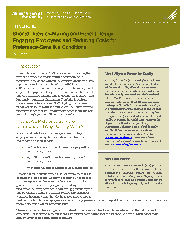Shared decision-making (SDM) involves incorporating the patient's perspective and values into decisions about treatment in collaboration with the clinician when there is no “right” course of treatment based on available evidence. SDM has drawn attention in recent years as the value placed on patient engagement has grown and as research has found that well-informed patients tend to choose less invasive—and less costly—treatment alternatives.
This brief introduces preference-sensitive care and SDM; highlights emerging initiatives by health plans and employers (including financial incentives to adopt SDM); and suggests action steps and key issues for employers, and regional health improvement collaboratives to consider.


